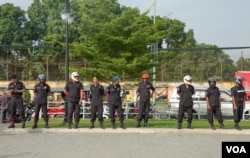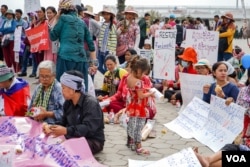Unions and rights groups have criticized the government and local authorities for placing “restrictions” on their planned events to mark International Human Rights Day on Monday.
Several hundred participants, led by nine unions and non-governmental groups, gathered in the capital’s Democracy Square on Monday to mark 70 years since the signing of the Universal Declaration of Human Rights.
The demonstrators were met by a heavy police presence, as well as the deployment of informal para-police forces.
Rights groups said their attempts to request a rally through the streets, as is the custom, were rejected by the authorities.
Mean Chanyada, a Phnom Penh deputy governor, said the gathering would be restricted to the square in a letter to its organizers.
But the groups said the decision contradicted earlier instructions by Interior Minister Sar Kheng, who called on police to “facilitate” the demonstration with or without formal approval.
The instruction was seen by organizers as part of a wider easing of tensions by the ruling Cambodian People’s Party, which has faced pressure from the international community following its dissolution of the country’s main opposition.
Sar Mory, one of the organizers and the deputy president of the Cambodian Youth Network, said the restrictions on the rally was a “missed opportunity” by the government.
“We see this as a metaphor for the government and the Interior Ministry to call a house ‘open’ while locking its front door. This means peaceful assembly and expression is still under treat and restriction,” Mory told VOA Khmer.
Mory added that the strong show of force by the police had persuaded organizers to follow the authorities’ instructions.
Speakers at the event included Cambodians affected by land grabs, such as Sem Thy, who has lost his farmland in a dispute with China’s Union Development Group, and Som Somaly, who lost land during the Borei Keila evictions.
“Most of the people attending the rally today are from communities affected by land disputes,” Somaly said. “When I was pregnant with this girl, I was already an active protester. And now she is growing bigger – now six years old – and now able to join protests for her mother’s housing rights.”
Leng Mom, a 28-year-old garment worker, said she hoped that her rights in the workplace would be honored and respected.
“My wish is that the workers are free from their employers’ exploitation. It has been hard working with the Chinese employers these days with a constant daily routine of ten-hour work and they only think about their incomes, not our well-being,” she said.
Mao Sokha, a resident of Phnom Penh’s Boeung Kak Community, said she wanted a full restoration of democratic space for average citizens like herself.
“In fact, our turnout today is a message to the government that we want rights and freedom for every citizen … we want solutions to everyone’s problems and we do not want our people to live in hard conditions.”
Met Measpheakdey, Phnom Penh Municipal Administration spokesman, said the fact that the groups were allowed to “smoothly” and “successfully” gather and hold the event was evidence of government’s openness.
“We welcome and agree that the NGOs shall be subject to freedom of assembly and expression, but they only need to do it at a location set out by the laws that we already design for them at the New Democracy Square, which is an appropriate space for those activities,” Measpheakdey said.
“So there is no reason for them to gather elsewhere in other parks in the city and it doesn’t mean you have to rally on the streets to qualify as free expression,” he added.
The government also held its own celebration of the day with the ruling party’s Deputy President Say Chhum leading a workshop of officials and calling for cooperation between state officials and the civil society to promote peace and human rights.









